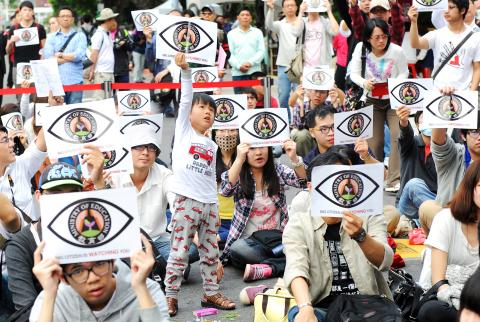A group of teachers from across the country yesterday began a hunger strike outside the Ministry of Education building in Taipei, accusing the ministry of having political motivations behind its recent adjustment of curriculum guidelines.
“We are gathered here today [yesterday], because Feb. 28 is a symbolic day. It’s a day that is marked with the quest for social justice and civil liberties for Taiwanese,” said Wang Hsi (王希), spokesman of the Alliance of Awakened Citizens, which joined the teachers in their action.
“Injustice still exists today, such as the government’s political intervention in the new education curriculum, and we’re glad that a group of teachers are here, telling the government that they will not accept this,” he said.

Photo: Lo Pei-de, Taipei Times
The recently announced curriculum guidelines have been described by many academics and teachers as changing the current Taiwan-oriented approach to history into a Sinocentric approach, as well as finding excuses for the Chinese Nationalist Party’s (KMT) authoritarian rule in civics education.
“A committee within the ministry began talking about curriculum change in December, and finalized the plan and the curriculum guidelines by January, without even asking academics who are opposed to it for their opinions,” said Nieh Sung-ling (聶松齡), a civics teacher from Kaohsiung Municipal Wenshan Senior High School.
“The ministry claims that the committee members have fully discussed all opinions, but how is that possible? If, as the ministry says, it consulted teachers during the process, can it give us just 10 names of the teachers they consulted?” Nieh asked.
Hsu Shih-jung (徐世榮), a professor at National Chengchi University’s Department of Land Economics, said that many Cabinet members have stepped down recently, but Minister of Education Chiang Wei-ling (蔣偉寧) should also have resigned.
“Taiwan is a nation of immigrants, people moved here at different times and so it is natural that different groups may have different views on history,” Hsu said. “As a democracy, we should try to respect people instead of trying to wipe out all other views with a ‘Greater China’ ideology.”
A civics teacher from National Tainan Girls’ High School, Yang Su-fang (楊素芳), who was among the people in the hunger strike, showed a copy of the new curriculum released by the ministry and compared it with the current one.
“Currently, the textbook is critical to the government’s rule from the late 1940s to the 1980s, calling it the ‘White Terror Period,” Yang said. “But in the new one, it would be explained as a necessary evil, that the authoritarian rule was something the government did not want to carry out at the time, but was obliged to.”
Yang added that this is not what civics education should do, “because the purpose of civics education is teaching students about the values of human rights, not finding excuses for human rights violations.”
“We civics teachers standing up to injustice is also part of that education,” Yang said.

Taipei has once again made it to the top 100 in Oxford Economics’ Global Cities Index 2025 report, moving up five places from last year to 60. The annual index, which was published last month, evaluated 1,000 of the most populated metropolises based on five indices — economics, human capital, quality of life, environment and governance. New York maintained its top spot this year, placing first in the economics index thanks to the strength of its vibrant financial industry and economic stability. Taipei ranked 263rd in economics, 44th in human capital, 15th in quality of life, 284th for environment and 75th in governance,

Greenpeace yesterday said that it is to appeal a decision last month by the Taipei High Administrative Court to dismiss its 2021 lawsuit against the Ministry of Economic Affairs over “loose” regulations governing major corporate electricity consumers. The climate-related lawsuit — the first of its kind in Taiwan — sought to require the government to enforce higher green energy thresholds on major corporations to reduce emissions in light of climate change and an uptick in extreme weather. The suit, filed by Greenpeace East Asia, the Environmental Jurists Association and four individual plaintiffs, was dismissed on May 8 following four years of litigation. The

A former officer in China’s People’s Liberation Army (PLA) who witnessed the aftermath of the 1989 Tiananmen Square massacre has warned that Taiwan could face a similar fate if China attempts to unify the country by force. Li Xiaoming (李曉明), who was deployed to Beijing as a junior officer during the crackdown, said Taiwanese people should study the massacre carefully, because it offers a glimpse of what Beijing is willing to do to suppress dissent. “What happened in Tiananmen Square could happen in Taiwan too,” Li told CNA in a May 22 interview, ahead of the massacre’s 36th anniversary. “If Taiwanese students or

The New Taipei City Government would assist relatives of those killed or injured in last month’s car-ramming incident in Sansia District (三峽) to secure compensation, Mayor Hou You-yi (侯友宜) said yesterday, two days after the driver died in a hospital. “The city government will do its best to help the relatives of the car crash incident seek compensation,” Hou said. The mayor also said that the city’s Legal Affairs, Education and Social Welfare departments have established a joint mechanism to “provide coordinated assistance” to victims and their families. Three people were killed and 12 injured when a car plowed into schoolchildren and their